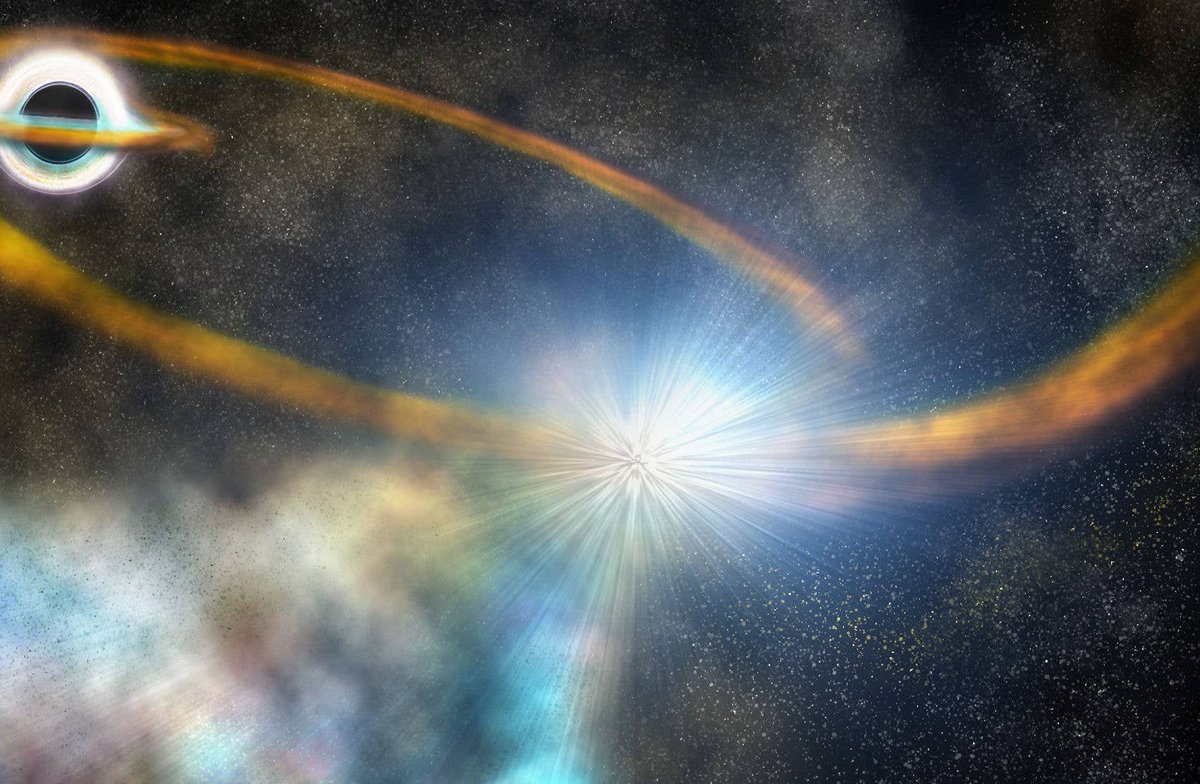I think today we are all that star. https://www.syfy.com/syfywire/astronomers-get-a-front-row-seat-to-a-star-getting-torn-apart-by-a-huge-black-hole">https://www.syfy.com/syfywire/...
2/ If you& #39;ve ever wondered what happens to a star that gets too close to a gigantic black hole: It doesn& #39;t just fall in, BLOOP, and is gone.
Instead, *it gets torn apart*, material ripped off of it like a dandelion in a hurricane. https://www.youtube.com/watch?v=zCZNLOTryHs">https://www.youtube.com/watch...
Instead, *it gets torn apart*, material ripped off of it like a dandelion in a hurricane. https://www.youtube.com/watch?v=zCZNLOTryHs">https://www.youtube.com/watch...
3/ The matter pulled off forms a long thin stream — the star gets spaghettified — which whips around the black hole in a loop and can impact itself. Some falls to the black hole and forms an infernally hot disk. Both events create a *lot* of light.
4/ We& #39;ve seen this happen many times, usually in galaxies a long way off. But in 2019 light reached Earth from such an event that was "only" 215 million light years away. For galactic astronomers that& #39;s close! Even better, they caught it early, while it was still brightening.
5/ That& #39;s important, since that gave astronomers a chance to see what happens in the early stages. It took nearly a month to peak, and when it did it was emitting TEN BILLION TIMES AS MUCH ENERGY as the Sun.
So, yikes. That& #39;s as much energy as a whole (if small) galaxy!
So, yikes. That& #39;s as much energy as a whole (if small) galaxy!
6/ The black hole itself is about a million times the mass of the Sun, and the star got about 70 million km away before getting taffyfied. That& #39;s closer than the Earth is to the Sun. Mind you, we consider this a small example of a supermassive black hole! Some are way bigger.
7/ This enormous explosion of energy was observed by a bunch of different observatories across the electromagnetic spectrum, too, so I expect this will be an iconic example for future studies.
8/ By the way, because astronomers suck at naming things, this ridiculously violent and cataclysmic explosion that results in the possible destruction of an entire star is called a "tidal disruption event". <yawn>
9/9 I suppose I could end with some smarmy "this puts life on Earth in perspective" kind of aphorism, but screw that. What& #39;s going on here is *important*. So instead, I& #39;ll end with this:
VOTE.
VOTE VOTE VOTEY VOTE VOTE
*Please* https://www.syfy.com/syfywire/astronomers-get-a-front-row-seat-to-a-star-getting-torn-apart-by-a-huge-black-hole">https://www.syfy.com/syfywire/...
VOTE.
VOTE VOTE VOTEY VOTE VOTE
*Please* https://www.syfy.com/syfywire/astronomers-get-a-front-row-seat-to-a-star-getting-torn-apart-by-a-huge-black-hole">https://www.syfy.com/syfywire/...

 Read on Twitter
Read on Twitter


